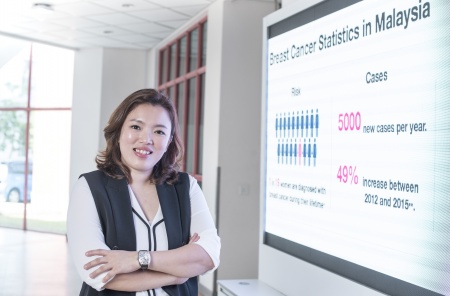Tuesday, 15 September 2020
A new study, led by Malaysian scientists in collaboration with Singapore and University of Cambridge, has revealed a genetics tool developed to help European women predict their breast cancer risk also works in Asian women. The research could help to address rising rates of breast cancer in Asia, where rates are predicted to increase by up to 50 per cent by 2025 (from 2012).
The tool called a Polygenic Risk Score (PRS) separates women into different risk groups based on their genetic sequence to identify those at higher risk of breast cancer. The results can empower women to decide which screening and prevention is right for them, and help reduce inefficiency, cost, and even possible harm caused by over-diagnosis.
The collaborative study, published in Nature Communications, involved Dr Ho Weang Kee, from the University of Nottingham; Prof Datin Paduka and Dr Teo Soo Hwang, Cancer Research Malaysia; Profs Douglas Easton and Antonis Antoniou, University of Cambridge; Prof Nur Aishah Mohd Taib, Universiti Malaya; Prof Dato’ and Dr Yip Cheng Har, Subang Jaya Medical Centre; Assc. Prof Mikael Hartman, National University Health System; Dr Li Jingmei, Genome Institute of Singapore; six hospitals in Singapore; and a large population-based prospective cohort from Singapore.
This was the first large study using the PRS in an Asian population. Previously, Asian studies were nearly six times smaller than studies in European women, and due to lack of data in Asians, it was unclear if PRS was effective in predicting breast cancer risk in non-European women. Thanks to such significant data sets from Malaysia and Singapore for this study, the researchers now know PRS can help to identify more accurately who is at high risk of breast cancer.
Dr Ho Weang Kee believes this factor contributes to the low uptake in Asia, particularly in its developing countries.
 Dr Ho Weang Kee, Faculty of Science and Engineering, University of Nottingham, Malaysia
Dr Ho Weang Kee, Faculty of Science and Engineering, University of Nottingham, Malaysia
“The cost-effective alternative to population-based screening is targeted screening, where we can reallocate limited healthcare resources in developing Asian countries by targeting the expensive mammography screening at women who are at higher risk of the disease. This is where the tool comes in - to give women an estimate of their risk of developing breast cancer.”
“Our study is a critical piece of the puzzle that helps us better understand breast cancer risks in different women around the world. There are differences in the genetic make-up of Asian women compared to women of European descent, which means their propensity to develop breast cancer may be different. Understanding this can help us to work out why some women are at higher risk of the disease, which in turn should help us to improve screening, prevention and ultimately treatment of the disease,” said Professor Douglas Easton, Director of the Centre for Cancer Genetic Epidemiology, University of Cambridge, and co-lead of the study.
“We have been developing a model for predicting breast cancer risk in European women that includes the PRS and this is now approved for clinical use. This study is the first big step towards enabling the use of such tools in the clinical management of women of Asian ancestry,” said Professor Antonis Antoniou, University of Cambridge, and co-lead of the study.
While the new tool is also applicable to women of Asian ancestry - hence including Asian women living in non-Asian countries in the study - genetics do interact with lifestyle factors on breast cancer risk, and lifestyle factors may be different between Asians living in Asia and Asians living in the West.
The study was supported by numerous research grants and charitable funding, principally from the Medical Research Council and Academy of Sciences Malaysia via the Newton-Ungku Omar Fund, the Wellcome Trust Collaborative Science Award, Yayasan Sime Darby, Yayasan PETRONAS, and Estee Lauder Group of Companies.
Story credits
For media enquiries, contact Dr Ho Weang Kee, University of Nottingham, Malaysia on WeangKee.Ho@nottingham.edu.my
Notes to editors:
About the University of Nottingham
Ranked 32 in Europe and 16th in the UK by the QS World University Rankings: Europe 2024, the University of Nottingham is a founding member of the Russell Group of research-intensive universities. Studying at the University of Nottingham is a life-changing experience, and we pride ourselves on unlocking the potential of our students. We have a pioneering spirit, expressed in the vision of our founder Sir Jesse Boot, which has seen us lead the way in establishing campuses in China and Malaysia - part of a globally connected network of education, research and industrial engagement.
Nottingham was crowned Sports University of the Year by The Times and Sunday Times Good University Guide 2024 – the third time it has been given the honour since 2018 – and by the Daily Mail University Guide 2024.
The university is among the best universities in the UK for the strength of our research, positioned seventh for research power in the UK according to REF 2021. The birthplace of discoveries such as MRI and ibuprofen, our innovations transform lives and tackle global problems such as sustainable food supplies, ending modern slavery, developing greener transport, and reducing reliance on fossil fuels.
The university is a major employer and industry partner - locally and globally - and our graduates are the second most targeted by the UK's top employers, according to The Graduate Market in 2022 report by High Fliers Research.
We lead the Universities for Nottingham initiative, in partnership with Nottingham Trent University, a pioneering collaboration between the city’s two world-class institutions to improve levels of prosperity, opportunity, sustainability, health and wellbeing for residents in the city and region we are proud to call home.
More news…